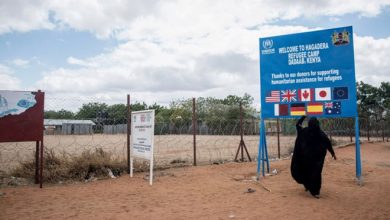Travellers from Europe, Middle East, Africa now must provide fingerprints when applying to visit Canada
Travellers from Europe, Middle East, Africa now must provide fingerprints when applying to visit Canada
Starting Tuesday, travellers from Europe, the Middle East and Africa will have to provide fingerprints and photos when they apply to visit, work or study in Canada, if they don’t want to be turned away at the border.
Currently, foreign nationals are required to obtain pre-authorization to travel to Canada by air, and the biometric check on arrival is an extra step to confirm a person seeking admission is really the same pre-screened individual on the travel documents.
“Biometric screening has proven effective in protecting the safety and security of Canadians and the integrity of the immigration system. Systematic fingerprint verification allows border service officers to confirm a traveller’s identity,” said Immigration Department spokesperson Shannon Kerr.
“Biometric screening has also made it easier to identify known criminals at the earliest opportunity in order to prevent them from coming to Canada. It has made it more difficult for others to forge, steal or use another person’s identity to gain access to Canada,” Kerr added.
Since 2013, personal biometric information has been required of tourists, students and foreign workers from 29 countries including Afghanistan, Burma, Congo, Haiti, Sudan and Syria, as well as the Palestinian territories — all places where many refugees originate and the use of fraudulent travel documents is rampant.
In addition, all permanent residency applicants and those seeking asylum within Canada, regardless of their country of origin, are already required to undergo biometric screening. The rule will extend to visitors from Asia, the Asia-Pacific region and the Americas on Dec. 31, when the biometric plan will be fully implemented.
“Expanding the collection and verification of biometrics to more applicants will strengthen immigration and border screening processes by confirming a person’s identity,” said Kerr.
Since the requirement rolled out in 2013, Canada has collected biometric information from 1,066,806 students, foreign workers and tourists, resulting in matches to 760 Canadian criminal records, 1,951 previous asylum claimants and 157,105 previous immigration applicants, said Kerr.
The fingerprints, stored by the RCMP in the “national repository,” are valid for 10 years and must be renewed when they expire.
Some travellers are exempt from the biometrics requirement:
-Visa-exempted nationals coming to Canada as tourists who hold a valid electronic travel authorization from Ottawa.
– Children under 14 or applicants over 79.
– Heads of state and government.
– U.S. visa holders transiting through Canada.
Foreign nationals travelling to Canada must go to a Canadian visa application centre and pay a fee of $85 per person — or $170 for families — to cover the collection of fingerprints and a photograph. The centre is responsible for transmitting the records to and from the immigration offices.
At airports and land ports of entry, the Canada Border Services Agency will check a visitor’s fingerprints against the record submitted by the visa centre in its database. Automatic fingerprint verification is available at eight major airports: Toronto Pearson, Calgary, Vancouver, Edmonton, Winnipeg, Ottawa, Pierre Elliott Trudeau in Montreal, and Halifax.
Authorities can deny entry to people with unmatched fingerprints, detain them and send them back.
The biometrics initiative is part of a joint border security information-sharing arrangement with the U.S., Australia, New Zealand and the U.K.
Both the U.S. and Australia require fingerprints and a photograph from visiting foreign nationals, except Canadians. In the U.K., foreign nationals from outside the European Economic Area have to apply for what’s known as a biometric residence permit, while New Zealand currently requires the biometrics of asylum seekers, refugees applying for resettlement and deportees.
Biometrics are not required of Americans applying for work or study permits and coming to Canada as tourists.
For the latest news update please visit Saafifilms.com For more enteratainment visit Saafistudio.com





